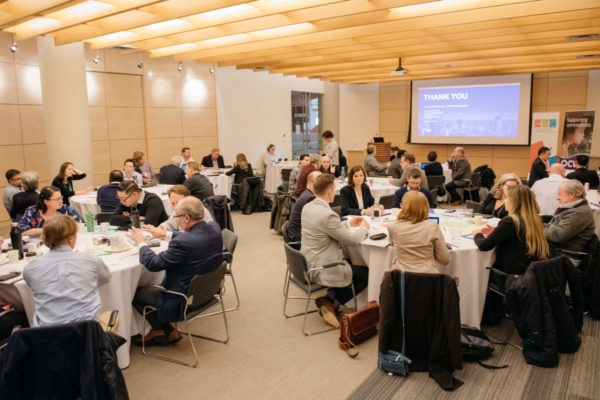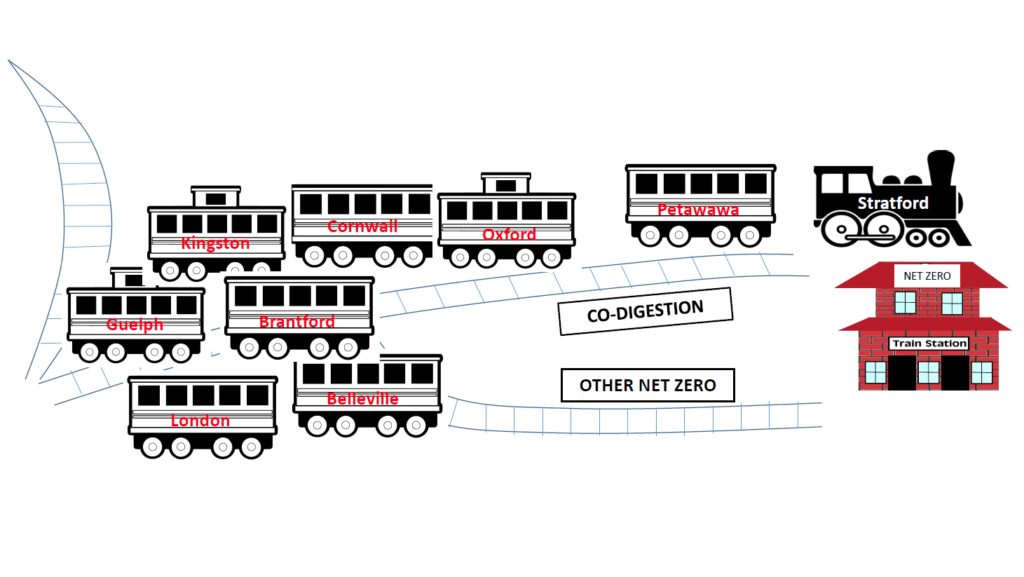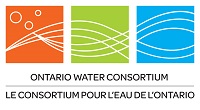On Monday, February 10, 2020, the Ontario Water Consortium (OWC) hosted the third Getting to Net Zero Energy Wastewater event in partnership with the Ontario Clean Water Agency (OCWA). The purpose of this event was to build upon previous conversations and continue the momentum toward getting five municipal wastewater treatment facilities to net zero energy by 2022, specifically focusing on opportunities for co-digestion at these facilities. More than 60 participants representing various stakeholder groups gathered at the Toronto Reference Library for the day-long discussions.
To lay the groundwork for the day, Alicia Fraser (OCWA) and Brenda Lucas (OWC) reflected on where the conversation left off in 2017 and what progress had been made by municipalities. Stratford was the first municipality to start down the net zero energy wastewater treatment path by pursuing innovative technology to enable co-digestion in their existing anaerobic digestion infrastructure. Participants learned that Petawawa has also moved forward with a co-digestion option for net zero energy at its wastewater treatment plant. All of the other participating municipalities (i.e., Belleville, Brantford, Cornwall, Guelph, Kingston, London, Oxford County) are considering this or other options for advancing net zero (which was represented at the event with an analogy of trains moving down the track toward net zero; see image below). The remainder of the day focused on presenting lessons learned from Stratford and Petawawa with a specific focus on approvals, regional and project planning and financing.
To begin the approvals themed segment, Ed Dujlovic [Presentation], Director of Infrastructure and Development Services, City of Stratford, Indra Maharjan, Director Innovation, Technology and Alternate Delivery, OCWA, and, Heather Malcolmson, Director Environmental Permissions, MECP spoke about their net zero energy wastewater treatment and co-digestion journey from their different perspectives.
The Stratford net zero energy wastewater treatment project, which involves the generation of biogas by co-digestion of wastewater sludge and municipal organic waste (in fact, it will be net-positive energy), has received approval from Stratford City Council, draft ECA approval, and is awaiting final ECA approval from MECP before the planned ground breaking this spring. Speakers emphasized the fact that all regulatory requirements for Stratford’s project were covered in a single comprehensive ECA, including Environmental Protection Act and Regulation 347 (Waste Management). The support for the provided by Partnerships Branch of MECP was also highlighted as a key to moving this project forward. Some key considerations with respect to the progress Stratford has made over the last three years include taking a collaborative approach and keeping the lines of communication open amongst partners and stakeholders. Further, all three presenters made reference to the importance of early and often communications and consultations with the public.

Copyright: Ontario Water Consortium
Immediately before the lunch break, the planning theme commenced with a focus on project development and implementation. Once again, Ed Dujlovic began the session followed by Dave Unrau [Presentation], Director of Public Works, Town of Petawawa. Both speakers emphasized their Council’s commitment to greenhouse gas reduction as a key driver, and the priority of shifting from wastewater treatment (cost centre) to resource recovery (and revenue generating centre). Both spoke about a culture change regarding organics management and the importance of understanding who the proponents and opponents for this change are, using that information to build relationships and generating open conversations.
Following a short break, the group reassembled for the next theme: planning – long term organics supply and disposition. Phil Sidhwa [Presentation], President, Orgatech Energy Inc., and Don Hoekstra, Consultant, emphasized the importance of managing feedstock availability, the potential for regional approaches (including centralized pre-processing) and the critical issue of digestate management. Dave Ellis [Presentation], Principal Engineer, Azura Associates took the group through the potential large volumes of organic feedstocks that may be demanded by stand-alone and on-farm digesters and the resulting potential competition for organic feedstocks that this creates.
The final thematic session on financing and business models was kicked off by Gordon Lau [Presentation], a Business Development Specialist from Enbridge Gas, followed by Tracy Haynes [Presentation], Impact Investing, The Atmospheric Fund (TAF). Both Gordon and Tracy spoke about their organizations’ support for innovative financing solutions for a low carbon economy.
To wrap up a very engaging and energetic day, participants were asked to articulate specific recommendations. More than half of respondents suggested that the government (municipal, provincial and/or federal) needs to play a role in getting to net zero. Some recommendations included more collaborative and innovative approaches to delivery and implementation, organics ban at landfill, ensuring stability of quantity and quality of feedstock, and streamlining the ECA process. Other recommendations involved the need for public advocacy, education and awareness of projects and more funding options for net zero projects.
Overall the event was well received. One participant stated, “Progress is being made on net zero initiatives through these gatherings.” Another expressed that, “breaking down components of net zero provided a better understanding of complexity.” Although the purpose of the event was to move the needle with respect to getting to net zero energy wastewater treatment, with a specific focus on the opportunity for co-digestion using existing anaerobic digestion infrastructure at municipal wastewater treatment plants, the presentations and discussion will also be used to inform a new document, “A Handbook for Co-digestion Projects at Municipal Wastewater Treatment Facilities”.
OWC and OCWA look forward to continuing this work with its partners towards net zero energy wastewater treatment and co-digestion and want to thank all those who attended for making this another successful event.
Event Documents
Summary of Recommendations
A Handbook for Co-digestion Projects at Municipal Wastewater Treatment Facilities

Progress towards net zero energy and co-digestion for municipalities. Copyright: Ontario Water Consortium


